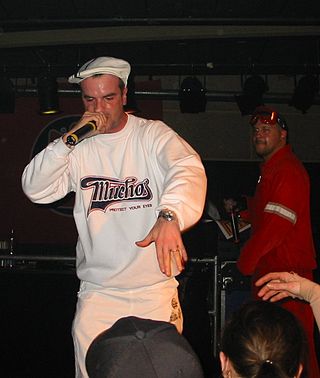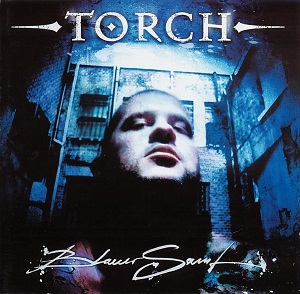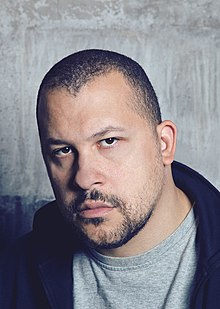
Advanced Chemistry is a German hip hop group from Heidelberg in Baden-Württemberg, South Germany. Advanced Chemistry was founded in 1987 by Toni L, Linguist, Gee-One, DJ Mike MD and MC Torch. Each member of the group holds German citizenship, and Toni L, Linguist, and Torch are of Italian, Ghanaian, and Haitian backgrounds, respectively.
Turkish hip hop refers to hip hop music produced by members of the Turkish minority in Germany, and to a lesser degree by hip hop artists in Turkey. The Turkish minority, called the Turks, first drew inspiration from the discrimination and racism they received while living as migrant workers in Germany in the 1960s. Turkish hip hop uses Arabesk music, a folk style that finds its roots in Turkey during the 1960s, and is influenced by the hip hop music of America and Germany. Album artwork, lyrical content, and the Turkish language are used by hip hop artists to express their uniquely Turkish identity.

The Universal Zulu Nation is an international hip hop awareness group formed by electro/hip hop artist Afrika Bambaataa.

Beat Street is a 1984 American dance drama film featuring New York City hip hop culture of the early 1980s. Set in the South Bronx, the film follows the lives of a pair of brothers and their group of friends, all of whom are devoted to various elements of early hip hop culture, including breakdancing, DJing and graffiti.

Die Fantastischen Vier, often shortened to Fanta 4, is a German hip hop band from Stuttgart. The members are Michael Schmidt (Smudo), Andreas Rieke, Thomas Dürr, and Michi Beck. They were, together with Advanced Chemistry, one of the earlier German-language rap groups.

Tomasz Kuklicz, known professionally as DJ Tomekk, is a Polish-born German-based hip hop DJ and record producer. Rappers who have featured in his songs include Ice-T, Fatman Scoop, Khia, Xzibit, Fler, Sido, Kurupt, Lil' Kim, KRS-One, Torch, Afrob, Flavor Flav, and GZA.
Kwanza Unit (KU) was an early Tanzanian hip hop group. Its name means "First Unit" and it was formed in 1993 by a merger of several groups and solo artists. They started rapping in English, but later used Swahili as well.

Feridun Zaimoğlu is a German author and visual artist of Turkish descent.

Frederick Crute, known professionally as Kool DJ Red Alert, is an Antiguan-American disc jockey who rose to fame on WRKS 98.7 Kiss FM in New York City and is recognized as one of the founding fathers of hip hop music and culture. His weekly radio show airs on WBLS 107.5 FM from Monday to Saturday at 6pm EST.
Luis Cedeño, more commonly known as DJ Disco Wiz is an American DJ.

Krauts with Attitude was released in 1991 under the Bombastic label. The album was compiled by DJs Michael Reinboth and Katmando. It features 15 different acts; three rapped in German, eleven in English, and one in French. This release was the first compilation of German hip-hop, and essentially helped create a hip-hop scene in Germany.
Neco Çelik is a Turkish-German filmmaker.
Alltag, released in 2003 by Turkish-German director Neco Celik, is a film depicting life in the neighborhood of Kreuzberg. The film has particular significance in the arena of Turkish-German hip-hop and hip-hop life in the neighborhood. Celik was born in 1972 and grew up in the neighborhood of Kreuzberg, and was directly influenced by the presence of hip hop and gang culture in Kreuzberg.

Toni Landomini, better known as Toni L, is one of the three artists comprising the famous German rap group Advanced Chemistry formed in 1987. He is often referred to as “der pate” or “the Godfather,” Toni holds German citizenship but has an Italian background. His Italian roots provide him with material for his rap songs, such as in Advanced Chemistry’s hit single “Fremd Im Eigenen Land”, where the group discusses the struggle to be accepted as a German. Toni has produced solo releases, beginning with his debut “Der Pate,” hence leading to his nickname. He has also founded the German hip-hop label MZEE.
King Size Terror is a German hip hop group of Turkish, Peruvian, and Afro-American origin.

Lance Taylor, also known as Afrika Bambaataa, is an American DJ, rapper, and record producer from South Bronx, New York City. He is notable for releasing a series of genre-defining electro tracks in the 1980s that influenced the development of hip hop culture. Afrika Bambaataa is one of the originators of breakbeat DJing.

Blauer Samt is the debut album by German hip hop artist Torch. It released in September 2000 by the labels V2 Records and 360° Records.

"Return of Hip Hop " is a 2001 single by DJ Tomekk from his debut album Return of Hip Hop. The song features KRS-One, Torch and MC Rene. KRS-One raps in English, Torch and MC Rene rap in German. The song peaked at No. 13 in Germany.

René El Khazraje, best known by his stage name MC Rene, is a German rapper and stand-up comedian.

Brim Fuentes, is the founding member of graffiti crew TATS CRU, and was born in the South Bronx, New York City. Brim was fortunate enough to start writing graffiti in one of the most important periods of graffiti history. He began bombing and hitting New York City Subway trains, in the late 1970s, all the way through to the mid-1980s. After the trains were cleaned in 1989 he and the rest of TATS CRU took to the streets and began bombing and creating street art all over the city.














